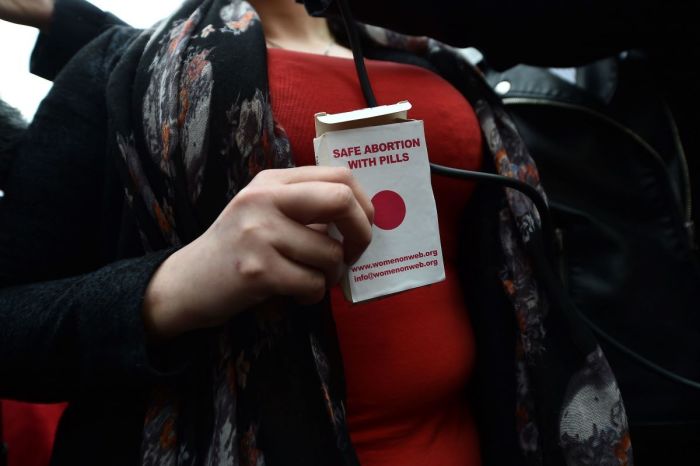FDA warns prescribing abortion pills before pregnancy could endanger women's health

The U.S. Food and Drug Administration has spoken out against healthcare providers prescribing abortion pills to non-pregnant women in light of the U.S. Supreme Court overturning Roe v. Wade, saying it could endanger women's health.
"The FDA is concerned about the advance prescribing of mifepristone for this use," an FDA spokesperson told Politico on Friday. "Mifepristone is not approved for advance provision of a medical abortion."
The government's statement comes as telemedicine and in-person providers have started prescribing abortion pills — mifepristone and misoprostol — to women before they're pregnant in case they plan to have an abortion in the future, and their state restricts access.
The Supreme Court's June ruling in Dobbs v. Jackson Women's Health Organization restored the state's authority to ban abortion, with several states outlawing or severely restricting the procedure following Roe's reversal.
The FDA noted the risk of a woman taking mifepristone weeks or months after the prescription is filled. Mifepristone is the first drug in the chemical abortion pill regimen that stops the flow of progesterone to the fetus to prevent it from growing. The agency stated that a physician likely will not have had the chance to screen the woman for an ectopic pregnancy or other potential complications, which could endanger patients.
Dr. Susan Bane, a board member of the American Association of Pro-Life Obstetricians and Gynecologists, a group of thousands of pro-life medical professionals, agrees with the FDA's assessment.
Bane wrote in a statement submitted to The Christian Post that doctors do not have medical authorization to prescribe mifepristone before a woman is pregnant.
"The risks of medical abortion are the same whether the pregnancy is wanted or not," Bane wrote. "The first risk is failing to diagnose an ectopic pregnancy."
The doctor said a pregnancy occurs outside the uterine cavity during an ectopic pregnancy and can be life-threatening if the fallopian tube ruptures.
"Determination of pregnancy location, intrauterine (in the uterus) versus ectopic (outside the uterus), requires an ultrasound," Bane wrote.
"Since the medications used to induce an abortion do not treat ectopic pregnancy, women who desire an abortion and receive abortion medications without an ultrasound may result in delayed detection and treatment of an ectopic pregnancy, increasing the risk of greater internal bleeding and risk for death."
Cindy Adam, CEO of telemedicine provider Choix, disagrees, calling chemical abortion pill restrictions "unnecessary." In a statement to Politico, Adam insists that the process is "safe." The telehealth provider began offering women abortion pills before pregnancy due to the court's decision this summer.
"Science has consistently shown that when people have accurate information and access to abortion pills they can safely end a pregnancy in their own homes," she said. "Providing abortion care through advance provision should be no different."
Choix did not immediately respond to The Christian Post's request for comment.
Another group offering women abortion pills before pregnancy is Aid Access, a European organization that vowed to continue shipping abortion pills to the United States after Roe's reversal. The organization started offering abortion pills in advance last fall when Texas' six-week abortion ban took effect.
Over a month after the court overturned Roe in June, Aid Access reported that it received 4,000 requests daily for abortion pills, up from 600 to 700 a day.
Last year, pro-life activists condemned the FDA's decision to eliminate the in-person dispensing requirement for abortion pills, allowing women to obtain the drugs by mail without seeing a doctor.
The FDA announced a temporary suspension of the requirement last April due to COVID-19, but in December, the organization made the decision permanent.
In a statement, Randall O'Bannon, director of education and research at National Right to Life, claimed the FDA is endangering women.
"Making this change permanent puts women at greater risk because they may not be adequately screened to make sure they have no disqualifying conditions like allergies or ectopic pregnancy and are not so far along that the drugs will not work or are more likely to result in life-threatening complications," O'Bannon said.
"Without that screening or monitoring, the likelihood of hemorrhage, infection, and missed ectopic pregnancy are greatly increased, and there is a greater possibility that a woman experiencing these adverse events may end up in the emergency room and could arrive too late for life-saving treatment."
According to a 2015 study published by Obstetrics & Gynecology titled "Incidence of Emergency Room Department Visits and Complications After Abortion," chemical abortions have a higher complication rate than surgical abortions.
The study used data from 2009 and 2010 to assess the abortion complication rate for California women who had abortions through Medicaid and those treated at the emergency room instead of the clinic.
Researchers found that the complication rate was 5.2% for women who took the abortion pill compared to 1.3% for women who had a first-trimester surgical abortion. The major complication rate for the abortion pill was .31% in contrast to .16% for first-trimester surgical abortions.
Samantha Kamman is a reporter for The Christian Post. She can be reached at: samantha.kamman@christianpost.com.





























